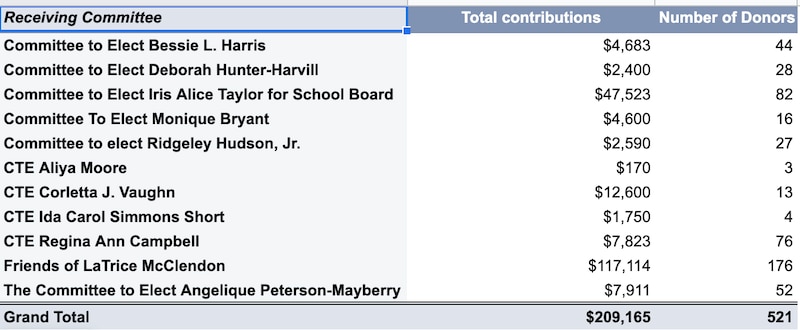A political newcomer in this year’s Detroit school board race is far outpacing incumbents in campaign donations.
LaTrice McClendon, a district parent as well as the Detroit community president for Huntington Bank, has reported about $117,000 in donations, more than half the total donations to candidates, according to campaign filings for the Nov. 8 election.
Trailing McClendon is former school board member Iris Taylor, who has received over $47,000. Taylor led the board as president from 2017 until she lost her reelection bid in 2020. Incumbent Corletta Vaughn came in third with over $12,000 in donations, while the remaining candidates who filed fundraising records all reported below $10,000.
As of Thursday evening, 11 of the 18 candidates on the ballot for the Detroit Public Schools Community District school board had submitted their donor contributions, offering a glimpse of the prominent figures and everyday citizens backing them. The Wayne County Clerk’s Office required all candidates to submit their pre-election contributions by Oct. 28. A late-filing deadline for reporting campaign contributions ends on Nov. 5.
Tuesday’s general election comes at a pivotal time for Michigan’s largest school district, where the pandemic has exacerbated a number of challenges. Chronic absenteeism has surged. Students have left the district in large numbers in recent years. Youth leaders are advocating for increased mental health resources and safe spaces. And the district is investing federal COVID relief funds toward tutoring programs to address student learning loss in reading.
With over $209,000 in campaign contributions as of the pre-election filing deadline, fundraising for this year’s race is on pace to be about the same as in previous school board elections.

Two prominent pastors are among the notable donors to several candidates this year.
Horace L. Sheffield III, pastor of Detroit’s New Destiny Christian Fellowship, donated $6,500 to McClendon and $3,750 to candidate Monique Bryant, the co-founder and president of a nonprofit. Sheffield couldn’t be reached for comment. But in a series of endorsement videos, Sheffield said he is backing both candidates because they are district parents.
Sheffield pointed to Bryant’s ongoing efforts to “improve the educational experience and success of our students.” And he said McClendon “is a parent and not just another politician.”
Another Detroit pastor, Edgar Vann II of Second Ebenezer Baptist Church, gave $1,150 to McClendon, $1,000 to Taylor, $1,000 to Bessie Harris, a retired educator, and $1,000 to Angelique Peterson-Mayberry, the school board president. Vann could not be reached for comment.
Candidates have also received donations from executives at investment and real estate firm Sterling Group, Huntington Bank, several current Detroit school district officials such as deputy superintendent of academics Elizabeth Cutrona, and the heads of prominent philanthropic foundations.
Among the political action committees that have poured money into the race are those associated with DTE Energy; United Auto Workers’ Michigan chapter; Rooted in Community Leadership; and Rock Holdings, a holding company for billionaire Dan Gilbert.
Meanwhile, Protecting Detroit’s Future, a 501(c)(4) nonprofit, has sent out materials in support of McClendon and Taylor. The organization was incorporated in September by W. Alan Wilk, an attorney with the Lansing-based Dykema law firm and a lawyer for Detroit Mayor Mike Duggan’s re-election campaign.
In 2020, Wilk incorporated two 501(c)(4) nonprofits — Detroiters for Change and Detroiters for Our Children — that backed Taylor and other incumbents running for re-election. The nonprofits paid for television spots, digital ads, and billboards. Wilk could not be reached for comment.
These organizations, while legal, have been criticized by campaign finance transparency advocates and labeled as “dark money” groups because they don’t have to disclose their contributors or expenditures.
The influx of spending on local elections can “change the nature of who can run and what kind of campaign they can muster,” said Rebecca Jacobsen, a professor of education policy at Michigan State University, who researches local school board election finances.
But at the same time, she said, such activity can also increase public skepticism, because voters may be dissuaded from backing candidates who receive major funding from outside figures. And while money is sure to get candidates better exposure, it “does not always guarantee a win,” Jacobsen said.
Ethan Bakuli is a reporter for Chalkbeat Detroit covering Detroit Public Schools Community District. Contact Ethan at ebakuli@chalkbeat.org.





